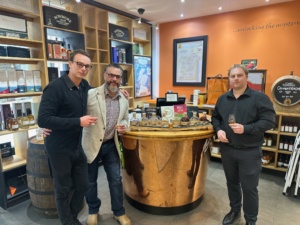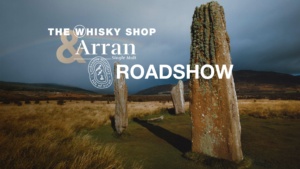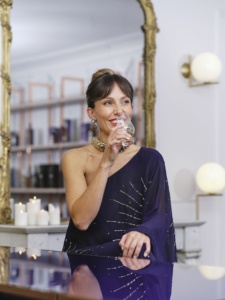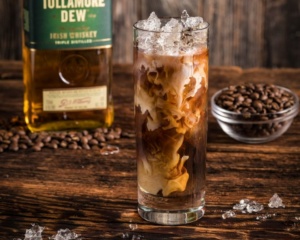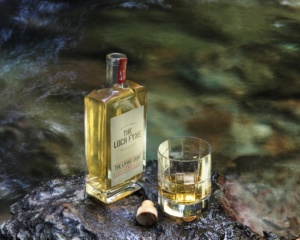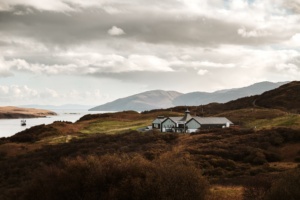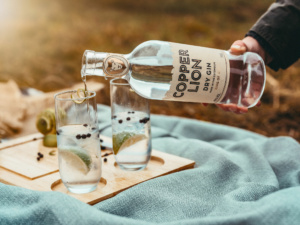The Three Gentlemen of Girona
Brothers, world-class chefs and proud holders of three Michelin stars, Joan, Josep, and Jordi Roca have been at the top of their culinary game for over three decades - and show no signs of stopping.
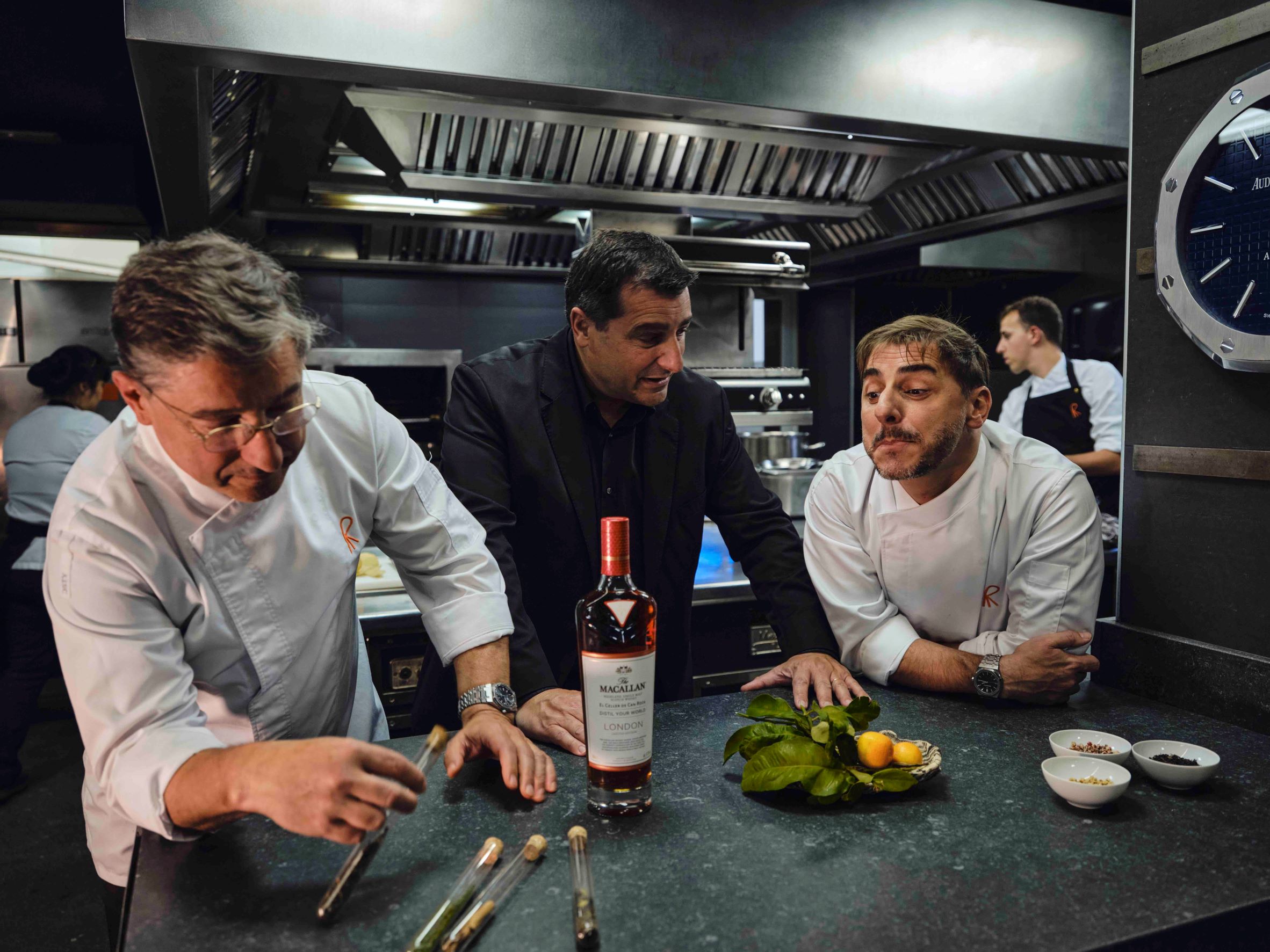
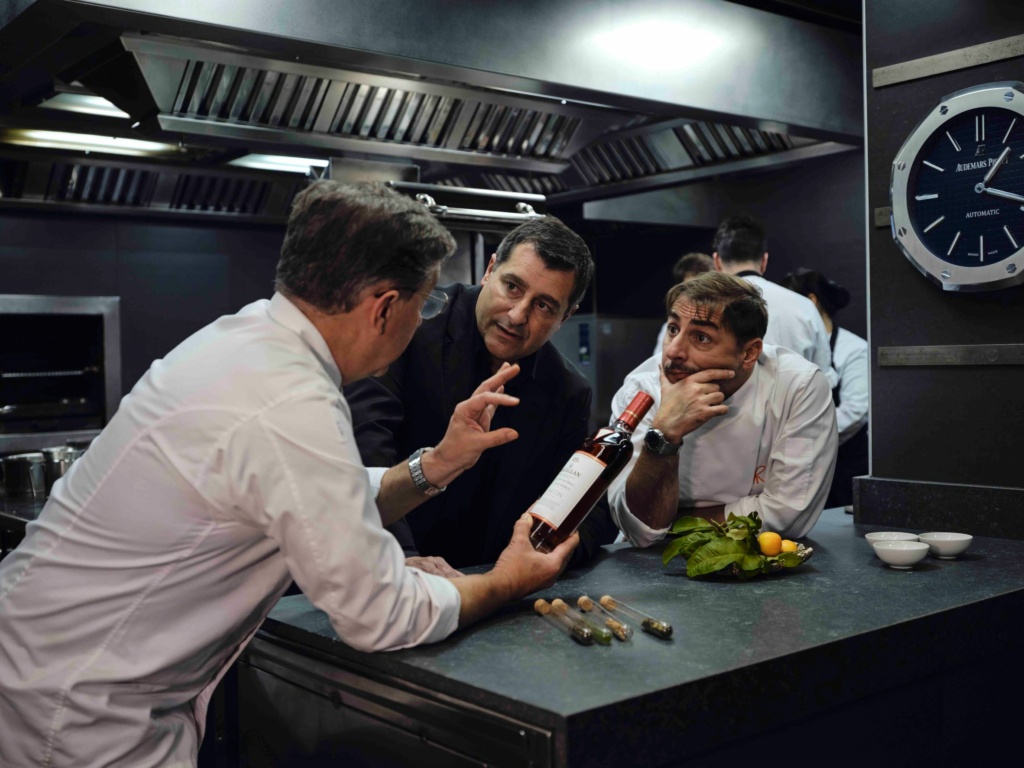 How did your time studying at cookery school shape your skills and talents?
JOAN: It was at cookery school that I discovered that as well as the lentils, "escudella", macaroni and potato salad we had at home, there were "ravigotes", "meunieres", "veloutes" and "parmentieres" - the stuff I had read about in classical French cookery books. These methods, unheard of at home, made sense to me and expanded my gastronomic imagination while I was studying. I was able to combine our traditional home cooking with what I learned at cookery school.
JORDI: I wasn't a good student like Joan. It was in fact Damian Allsop - a really talented Welsh pastry chef - who really inspired me when he worked at our restaurant at the end of the 1990s. He piqued my curiosity and helped to broaden my mind: first as his assistant, then as his successor.
Damian gave me the tools to truly understand sweet cooking - its methods and precision; the handicraft, patience, confidence and obsessive implication it requires. He taught me how to make a souffle rise, the need to temper chocolate, how a jelly sets, how to blow sugar as if I were making artisanal glass - and much, much more.
You opened your restaurant, El Celler de Can Roca, in 1986, with Jordi joining the team in 1997. How is it working together as brothers?
JOAN: Our working process is a three-part amalgamation of our individual disciplines, or "worlds." Josep is the liquid mind - the sommelier - representing the world of wine; Jordi is the sweet mind who takes care of the pastries and desserts; I'm the savoury mind and the architect who pulls all of our new creations and projects together in harmony.
JOSEP: There are many pros to working with your family - like trust. I think the fact that each of us master one discipline is good for us. It makes us a triangle from where we can offer our guests a very special, almost complete, dining experience.
How would you describe the cuisine of El Celler de Can Roca?
JOAN: Our cuisine is freestyle, embracing emotions and senses. We seek a perfect balance of creativity, innovation and technique, paying homage to local, seasonal ingredients and daring to push the boundaries without losing the essence of taste.
While you are innovators, your Catalan roots are important to you. How do you maintain tradition in your cooking?
JOAN: It's a question of balance. We play with senses and techniques to reinvent traditional recipes. We pursue creativity while committing to original flavours. We're inspired globally while sourcing locally. Tradition inspires us while we strive to innovate, to create surprising emotions and senses for our guests.
How did your time studying at cookery school shape your skills and talents?
JOAN: It was at cookery school that I discovered that as well as the lentils, "escudella", macaroni and potato salad we had at home, there were "ravigotes", "meunieres", "veloutes" and "parmentieres" - the stuff I had read about in classical French cookery books. These methods, unheard of at home, made sense to me and expanded my gastronomic imagination while I was studying. I was able to combine our traditional home cooking with what I learned at cookery school.
JORDI: I wasn't a good student like Joan. It was in fact Damian Allsop - a really talented Welsh pastry chef - who really inspired me when he worked at our restaurant at the end of the 1990s. He piqued my curiosity and helped to broaden my mind: first as his assistant, then as his successor.
Damian gave me the tools to truly understand sweet cooking - its methods and precision; the handicraft, patience, confidence and obsessive implication it requires. He taught me how to make a souffle rise, the need to temper chocolate, how a jelly sets, how to blow sugar as if I were making artisanal glass - and much, much more.
You opened your restaurant, El Celler de Can Roca, in 1986, with Jordi joining the team in 1997. How is it working together as brothers?
JOAN: Our working process is a three-part amalgamation of our individual disciplines, or "worlds." Josep is the liquid mind - the sommelier - representing the world of wine; Jordi is the sweet mind who takes care of the pastries and desserts; I'm the savoury mind and the architect who pulls all of our new creations and projects together in harmony.
JOSEP: There are many pros to working with your family - like trust. I think the fact that each of us master one discipline is good for us. It makes us a triangle from where we can offer our guests a very special, almost complete, dining experience.
How would you describe the cuisine of El Celler de Can Roca?
JOAN: Our cuisine is freestyle, embracing emotions and senses. We seek a perfect balance of creativity, innovation and technique, paying homage to local, seasonal ingredients and daring to push the boundaries without losing the essence of taste.
While you are innovators, your Catalan roots are important to you. How do you maintain tradition in your cooking?
JOAN: It's a question of balance. We play with senses and techniques to reinvent traditional recipes. We pursue creativity while committing to original flavours. We're inspired globally while sourcing locally. Tradition inspires us while we strive to innovate, to create surprising emotions and senses for our guests.
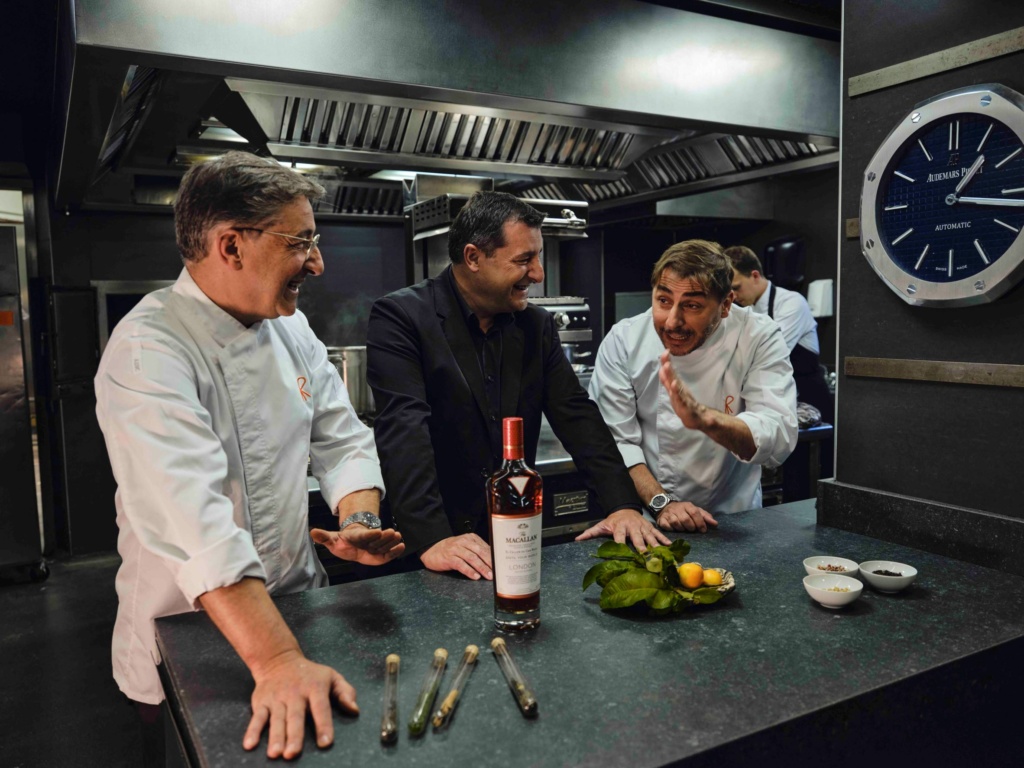 When creating a new dish, where do you start?
JOAN: It is a three-way collaboration at every step of the creative process. Sometimes the starting point might be the produce, or the landscape that reminds us of our commitment to the environment. Academic knowledge, personal memories and sense of humour very often inspire us, as well as daring innovation, perfume and smell, poetry and magic, the world of wine, and colours. We try to see everything from as wide an angle as possible.
Can you give an example of an idea that turned into a successful dish?
JORDI: For me, it is my dessert "Trip to Havana." I started seriously learning ice cream-making techniques under maestro Angelo Corvitto from Sicily. One of his rules of thumb was keeping the work atmosphere completely pure, and it's absolutely true. An ice cream is an emulsion in which air is a very important ingredient - it's a sponge for aromas. That golden rule sparked my imagination: what would happen if I intentionally added smoke? I'd heard of tobacco-flavoured ice creams made from an infusion and it occurred to me that using smoke directly might improve the final result. In my first experiments, I exhaled cigar smoke straight into the ice cream maker. The results were surprisingly good but I quickly realised that this method was neither practical nor very good for my health!
With my father's help, I built a water pump that blows out smoke automatically, without the need for my own lungs! In 2001, I presented "Trip to Havana": a dark chocolate cylinder filled with ice cream infused with Havana cigar smoke, and served with a mojito.
JOAN: For Josep and I, this was the moment we realised our brother Jordi was a dessert genius! It was also the moment we found the final vertex in our gastronomic triangle of liquid, savoury and sweet.
In 2009, El Celler de Can Roca was awarded its third Michelin star. What an achievement to accomplish alongside your brothers! Eleven years later, is the pressure still on?
JOSEP: It's never really been about the pressure for us, but rather a deep commitment to excellence. We embarked on our restaurant project over 30 years ago - we focus more on that than on what people say about us, which at the end of the day we have absolutely no control over. We keep working with our commitment to creativity and excellence, as passionately as we did on day one. What else can you do?
Exceptional food, exceptional whisky - your partnership with The Macallan seems like a match made in heaven! What do El Celler de Can Roca and The Macallan have in common?
JOAN: Both worlds speak the same language. The cooking process requires craftmanship, heritage, mastery and constant innovation - and whisky-making requires the same ingredients to make each expression a piece of art. We work with the best of everything, and The Macallan is the ultimate luxury spirit.
When creating a new dish, where do you start?
JOAN: It is a three-way collaboration at every step of the creative process. Sometimes the starting point might be the produce, or the landscape that reminds us of our commitment to the environment. Academic knowledge, personal memories and sense of humour very often inspire us, as well as daring innovation, perfume and smell, poetry and magic, the world of wine, and colours. We try to see everything from as wide an angle as possible.
Can you give an example of an idea that turned into a successful dish?
JORDI: For me, it is my dessert "Trip to Havana." I started seriously learning ice cream-making techniques under maestro Angelo Corvitto from Sicily. One of his rules of thumb was keeping the work atmosphere completely pure, and it's absolutely true. An ice cream is an emulsion in which air is a very important ingredient - it's a sponge for aromas. That golden rule sparked my imagination: what would happen if I intentionally added smoke? I'd heard of tobacco-flavoured ice creams made from an infusion and it occurred to me that using smoke directly might improve the final result. In my first experiments, I exhaled cigar smoke straight into the ice cream maker. The results were surprisingly good but I quickly realised that this method was neither practical nor very good for my health!
With my father's help, I built a water pump that blows out smoke automatically, without the need for my own lungs! In 2001, I presented "Trip to Havana": a dark chocolate cylinder filled with ice cream infused with Havana cigar smoke, and served with a mojito.
JOAN: For Josep and I, this was the moment we realised our brother Jordi was a dessert genius! It was also the moment we found the final vertex in our gastronomic triangle of liquid, savoury and sweet.
In 2009, El Celler de Can Roca was awarded its third Michelin star. What an achievement to accomplish alongside your brothers! Eleven years later, is the pressure still on?
JOSEP: It's never really been about the pressure for us, but rather a deep commitment to excellence. We embarked on our restaurant project over 30 years ago - we focus more on that than on what people say about us, which at the end of the day we have absolutely no control over. We keep working with our commitment to creativity and excellence, as passionately as we did on day one. What else can you do?
Exceptional food, exceptional whisky - your partnership with The Macallan seems like a match made in heaven! What do El Celler de Can Roca and The Macallan have in common?
JOAN: Both worlds speak the same language. The cooking process requires craftmanship, heritage, mastery and constant innovation - and whisky-making requires the same ingredients to make each expression a piece of art. We work with the best of everything, and The Macallan is the ultimate luxury spirit.
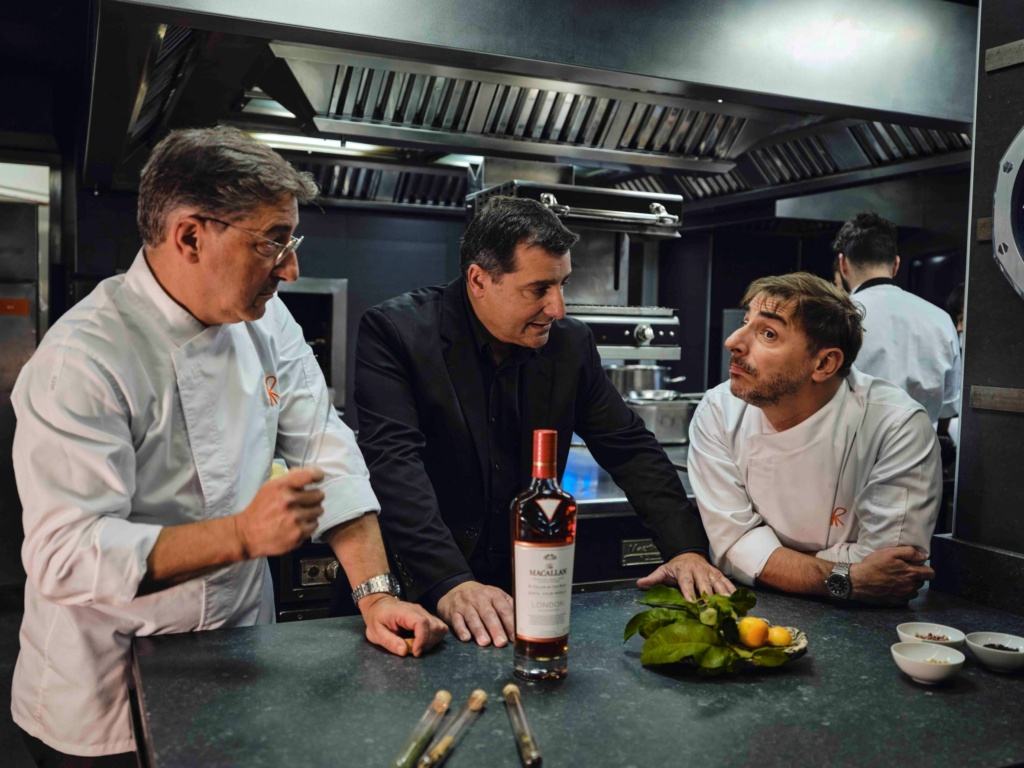 Your latest collaborative bottle with The Macallan - Distil Your World: The London Edition - took you on an adventure to the capital city. Tell us how your trip to London inspired you.
JOAN: Havin g the chance to spend time with the craftspeople and creators who drive London's inimitable creativity and entrepreneurship, committed leaders who add to its vibrancy, and special thinkers who understand its past and anticipate its future, was extremely enriching and inspiring.
To get the full feel of the city, we explored its most emblematic buildings and went behind the scenes at exceptional locations, discovering the unique flavours and scents that define a place like no other. We wandered around Borough Market with food historian Annie Gray, and smelled the shoots, roots, flowers and garden aromas in Regent's Park. We enjoyed the spicy smells of Asma Khan's Indian food at Darjeeling Express, and learned about the handling of tea with Edward Eisler from Jing. We expanded our knowledge of neuroscience and neurogastronomy with Professor Charles Spence - fascinating! - and spent valuable time with Mischa Dohler at the Royal Academy of Engineering.
Back in Girona, to develop the whisky, we held a creative session to extract the very essence of London. The places we visited and the people we met all now take shape in this whisky - our own distillation of the essence of London.
What does it taste like?
JOAN: We selected six first-fill European oak oloroso-seasoned casks that deliver unique tasting notes, representing the spirit of London.
The taste is slightly umami, with the subtle touch of curry and the sweetness of Earl Grey tea, as well as keeping The Macallan's signature taste of orange, vanilla and raisin. There are some special notes in there that are really rare to find.
Delicious! As well as creating Distil Your World: The London Edition, you also selected a Macallan single cask to be paired with a gastronomic experience at selected bars around London. Tell us about the pairings you have created.
JOAN: For the first experience, we've created a scallop dish served in a malt broth with wild mushrooms, sea fennel, roasted hazelnut and artichoke puree. The dish is reminiscent of the earth and greenery in the city's damp and rainy landscape, as well as London's produce from land and sea. The scallop is presented in the form of a goldsmith's work of art, recalling the city's wealth of museums and refined culture.
The second experience consists of three types of candied nuts: curry candied walnuts, Earl Grey candied macadamia nuts, and mint & ginger cashew nuts, each infused with unique London tasting notes, such as lemongrass, curry spice, and Earl Grey tea.
Both pairings complement notes of oak spice, lively ginger and cinnamon found in The Macallan single cask we selected.
Speaking of eating and drinking, where do you like to dine out in London?
JOSEP: It's a fascinating city for food: the world capital for cutting-edge gastronomy. London is always interesting in its capacity to generate business models that become world trends. It has a talent pool that combines business sense with culinary talent. The city's commitment to every culture that passes through it means you can find good, authentic food from a host of places: from a Georgian restaurant to a specialist in Nigerian cuisine.
And this is the same for the city's drinks scene. I love the bars Dandelyan and Artesia, and for wine, I go to Michael Sager of Sager + Wilde on Hackney Road. I love Isaac MacHale's take on contemporary Scotland at The Clove Club, the freshness of Lyle's, the eclecticism of Dinner, the wizardry of Master Sommelier Isa Bal at Trivet, the flavours at The Hide Bar... as well as something more offbeat like Xavier Rousset's Cabotte. Pall Mall 67 is also a must.
Your latest collaborative bottle with The Macallan - Distil Your World: The London Edition - took you on an adventure to the capital city. Tell us how your trip to London inspired you.
JOAN: Havin g the chance to spend time with the craftspeople and creators who drive London's inimitable creativity and entrepreneurship, committed leaders who add to its vibrancy, and special thinkers who understand its past and anticipate its future, was extremely enriching and inspiring.
To get the full feel of the city, we explored its most emblematic buildings and went behind the scenes at exceptional locations, discovering the unique flavours and scents that define a place like no other. We wandered around Borough Market with food historian Annie Gray, and smelled the shoots, roots, flowers and garden aromas in Regent's Park. We enjoyed the spicy smells of Asma Khan's Indian food at Darjeeling Express, and learned about the handling of tea with Edward Eisler from Jing. We expanded our knowledge of neuroscience and neurogastronomy with Professor Charles Spence - fascinating! - and spent valuable time with Mischa Dohler at the Royal Academy of Engineering.
Back in Girona, to develop the whisky, we held a creative session to extract the very essence of London. The places we visited and the people we met all now take shape in this whisky - our own distillation of the essence of London.
What does it taste like?
JOAN: We selected six first-fill European oak oloroso-seasoned casks that deliver unique tasting notes, representing the spirit of London.
The taste is slightly umami, with the subtle touch of curry and the sweetness of Earl Grey tea, as well as keeping The Macallan's signature taste of orange, vanilla and raisin. There are some special notes in there that are really rare to find.
Delicious! As well as creating Distil Your World: The London Edition, you also selected a Macallan single cask to be paired with a gastronomic experience at selected bars around London. Tell us about the pairings you have created.
JOAN: For the first experience, we've created a scallop dish served in a malt broth with wild mushrooms, sea fennel, roasted hazelnut and artichoke puree. The dish is reminiscent of the earth and greenery in the city's damp and rainy landscape, as well as London's produce from land and sea. The scallop is presented in the form of a goldsmith's work of art, recalling the city's wealth of museums and refined culture.
The second experience consists of three types of candied nuts: curry candied walnuts, Earl Grey candied macadamia nuts, and mint & ginger cashew nuts, each infused with unique London tasting notes, such as lemongrass, curry spice, and Earl Grey tea.
Both pairings complement notes of oak spice, lively ginger and cinnamon found in The Macallan single cask we selected.
Speaking of eating and drinking, where do you like to dine out in London?
JOSEP: It's a fascinating city for food: the world capital for cutting-edge gastronomy. London is always interesting in its capacity to generate business models that become world trends. It has a talent pool that combines business sense with culinary talent. The city's commitment to every culture that passes through it means you can find good, authentic food from a host of places: from a Georgian restaurant to a specialist in Nigerian cuisine.
And this is the same for the city's drinks scene. I love the bars Dandelyan and Artesia, and for wine, I go to Michael Sager of Sager + Wilde on Hackney Road. I love Isaac MacHale's take on contemporary Scotland at The Clove Club, the freshness of Lyle's, the eclecticism of Dinner, the wizardry of Master Sommelier Isa Bal at Trivet, the flavours at The Hide Bar... as well as something more offbeat like Xavier Rousset's Cabotte. Pall Mall 67 is also a must.
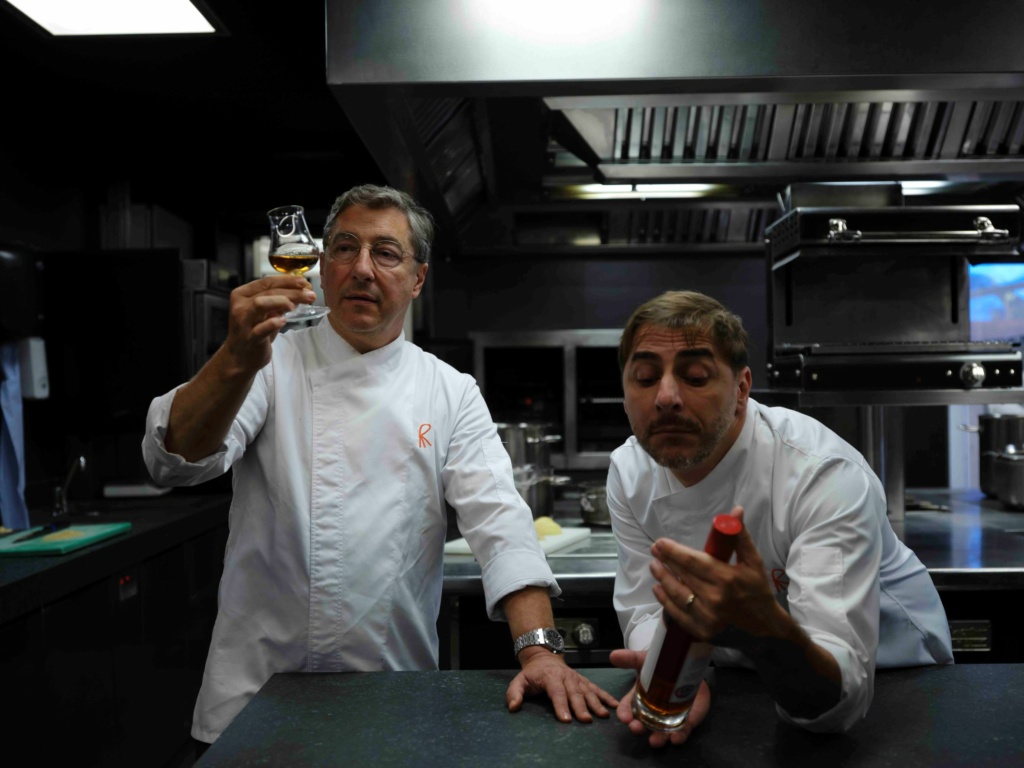 Do you ever take a night off cooking? If so, how do you relax?
JOSEP: I enjoy having a glass of wine or spirit in the evening, while reading books about wines and liqueurs. Cycling recharges my batteries before I go back to work.
JOAN: Morning walks are more my thing. I go at the crack of dawn, when the cobbled streets of Girona's old town are empty, and you can take in the beauty and history of its buildings. I love the peace and quiet at that time in the morning, when everything has yet to unfold and anything is possible. It's the hour of potential.
Do you ever take a night off cooking? If so, how do you relax?
JOSEP: I enjoy having a glass of wine or spirit in the evening, while reading books about wines and liqueurs. Cycling recharges my batteries before I go back to work.
JOAN: Morning walks are more my thing. I go at the crack of dawn, when the cobbled streets of Girona's old town are empty, and you can take in the beauty and history of its buildings. I love the peace and quiet at that time in the morning, when everything has yet to unfold and anything is possible. It's the hour of potential.
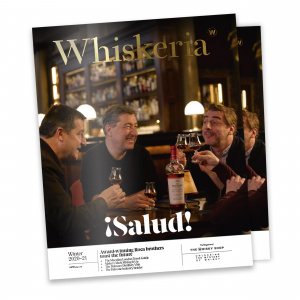 The original feature is our cover story in the Winter 2020-21 edition of Whiskeria, delivered to the door of W Club subscribers and also free with any Whisky Shop purchase in store or online. Click here to read the full Winter 2020-21 issue of Whiskeria online for free.
The original feature is our cover story in the Winter 2020-21 edition of Whiskeria, delivered to the door of W Club subscribers and also free with any Whisky Shop purchase in store or online. Click here to read the full Winter 2020-21 issue of Whiskeria online for free. 4.7/5 with 10,000+ reviews
4.7/5 with 10,000+ reviews
